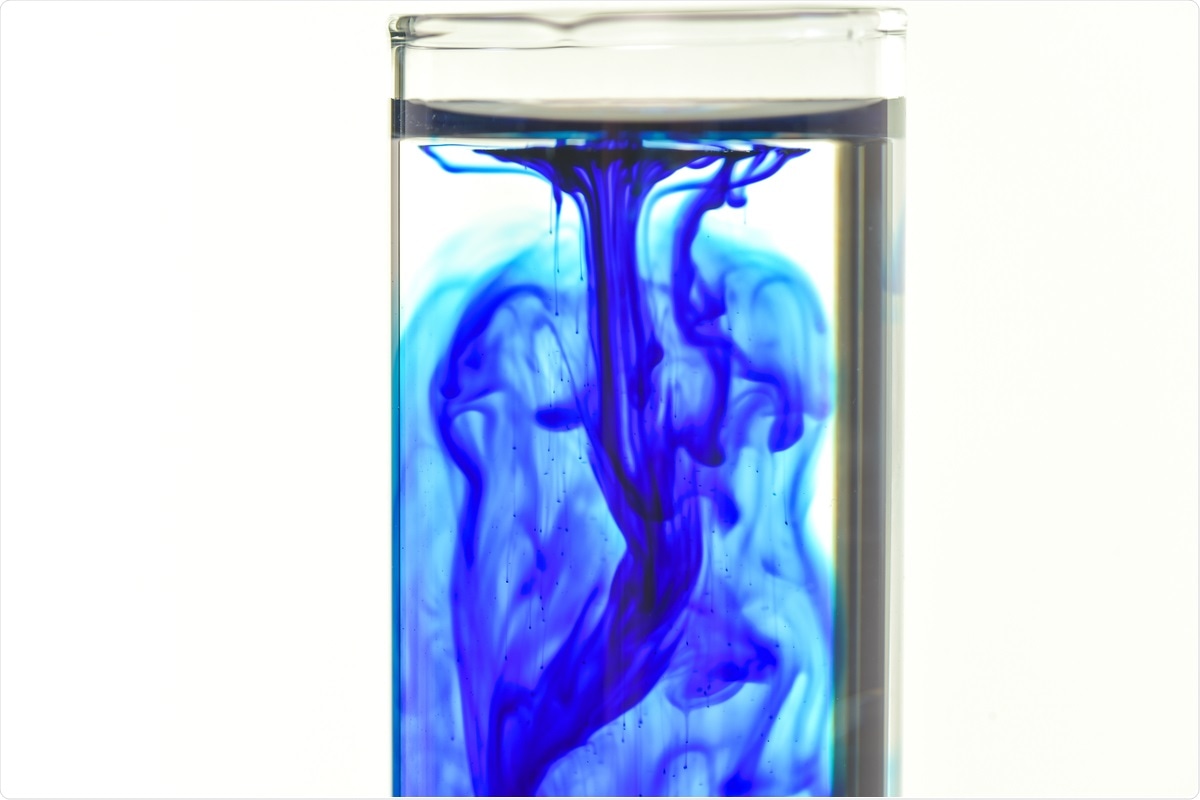Reviewed by Dan Hutchins, M.PhilMay 31 2021
According to a new study reported in Nature Scientific Reports, Methylene Blue, a century-old medication, can be a very efficient, broad-spectrum UV irradiation protector that absorbs UVA and UVB, repairs ROS and UV irradiation-induced DNA damage, and is safe for coral reefs.
According to the findings, Methylene Blue might become an alternative sunscreen material that benefits the environment while also protecting the health of human skin.

Methylene blue and water solution in a test tube. Image Credit: FreeProd33 / Shutterstock
Despite many studies showing that it hastens the degradation of coral reefs, oxybenzone is used as a chemical UV blocker in 80% of existing sunscreens. To prevent the disastrous consequences of oxybenzone and its derivatives on the world’s marine ecology, some governments and nations have officially prohibited its use.
Furthermore, consumers are particularly concerned with the Sun Protection Factor (SPF) to avoid sunburns and possibly serious long-term health consequences. SPF, on the other hand, only assesses UVB exposure, leaving sunscreen users susceptible to UVA-induced oxidative stress and photoaging.
Our work suggests that Methylene Blue is an effective UVB blocker with a number of highly desired characteristics as a promising ingredient to be included in sunscreens. It shows a broad spectrum absorption of both UVA and UVB rays, promotes DNA damage repair, combats reactive oxygen species (ROS) induced by UVA, and most importantly, poses no harm to coral reefs.”
Dr Kan Cao, Study Senior Author and Founder of Mblue Labs, Bluelene Skincare
Cao is also a Professor at the University of Maryland Department of Cell Biology and Molecular Genetics.
The research team, which includes experts from Mblue Labs and the University of Maryland, examined the UV protection benefits of Methylene Blue from various angles in primary human keratinocytes and skin fibroblasts from young and elderly donors and compared the results to oxybenzone.
They determined that Methylene Blue not only absorbs UVA and UVB like typical sunscreen actives do, but it also aids in the repair of DNA damage induced by UV irradiation, resulting in improved cell survival.
They also subjected Xenia umbellate, a soft coral species, to the same doses of Methylene Blue or oxybenzone in separate tanks and watched the coral reefs’ development and reactions to these chemicals.
They found that oxybenzone-treated Xenia corals bleached and died in less than a week, but Methylene Blue has no deleterious impact on coral health even at quite high concentrations (1 micromolar).
They also compared Methylene Blue’s capacity to decrease cellular oxidative stress to that of other well-known skincare antioxidants like Vitamin C and Vitamin A (Retinol).
We are extremely excited to see that skin fibroblasts, derived from both young and old individuals, have improved so much in terms of proliferation and cellular stress in a methylene blue-containing cell culture medium. Most surprisingly, we found that the combination of Methylene Blue and Vitamin C could deliver amazing anti-aging effects, particularly in skin cells from older donors, suggesting a strong synergistic reaction between these two beneficial antioxidants.”
Dr Kan Cao, Study Senior Author and Founder of Mblue Labs, Bluelene Skincare
“Altogether, our study suggests that Methylene Blue has the potential to be a coral reef-friendly sunscreen active ingredient that can provide broad-spectrum protection against UVA and UVB,” concluded the team.
The researchers are so sure about their results that Methylene Blue is an effective UV blocking agent that also slows skin aging and boosts DNA damage repair that they have submitted a patent application and have started to produce sunscreen prototypes using Methylene Blue.
Furthermore, Mblue Lab (Bluelene) just introduced Bluelene’s Night Plus+, the first multifunctional skincare solution that integrates Methylene Blue and Vitamin C to give superior anti-aging effects.
Source:
Journal reference:
Xiong, Z.-M., et al. (2021) Ultraviolet radiation protection potentials of Methylene Blue for human skin and coral reef health. Nature Scientific Reports. doi.org/10.1038/s41598-021-89970-2.